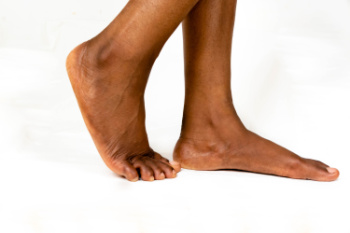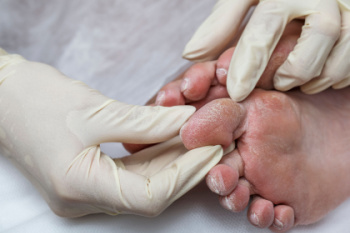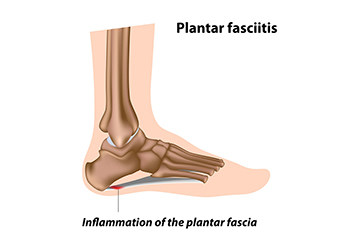
Flat feet, or fallen arches, occur when the arch of the foot is low or completely flattened, causing the entire sole to make contact with the ground. Having flat feet can affect the natural alignment of the body, potentially leading to pain in the feet, ankles, knees, or lower back. While flat feet do not always cause symptoms, common signs include foot pain, fatigue, and uneven shoe wear. This condition can arise from a failure of the arches to develop properly during childhood, or it can develop later in life due to aging, injury, or certain medical conditions like arthritis or diabetes. Treatment often focuses on reducing pain and improving foot function through the use of custom orthotics or supportive shoes, which help redistribute weight and improve alignment. In more severe cases, where pain persists or mobility is affected, surgery may be considered to reconstruct the arch or correct deformities. If you have persistent foot pain as a result of flat feet, it is suggested that you make an appointment with a podiatrist for treatment options.
Flatfoot is a condition many people suffer from. If you have flat feet, contact one of our podiatrists from Lovely Foot Associates, PC. Our doctors will treat your foot and ankle needs.
What Are Flat Feet?
Flatfoot is a condition in which the arch of the foot is depressed and the sole of the foot is almost completely in contact with the ground. About 20-30% of the population generally has flat feet because their arches never formed during growth.
Conditions & Problems:
Having flat feet makes it difficult to run or walk because of the stress placed on the ankles.
Alignment – The general alignment of your legs can be disrupted, because the ankles move inward which can cause major discomfort.
Knees – If you have complications with your knees, flat feet can be a contributor to arthritis in that area.
Symptoms
Treatment
If you are experiencing pain and stress on the foot you may weaken the posterior tibial tendon, which runs around the inside of the ankle.
If you have any questions please feel free to contact our office located in Johnstown, PA . We offer the newest diagnostic and treatment technologies for all your foot and ankle needs.

Diabetes can significantly impact foot health, leading to serious complications. One major issue is neuropathy, where high blood sugar levels damage the nerves, resulting in a loss of feeling in the feet. This loss of sensation makes it difficult to detect injuries, and can lead to sores and blisters that may not heal properly. Peripheral vascular disease, another complication from diabetes, reduces blood flow to the extremities, causing wound-healing issues and increasing the risk of gangrene. Common symptoms include swelling of the feet and ankles, persistent pain, and noticeable changes in skin color. Regular foot inspections and prompt care from a podiatrist are essential for managing these risks. Addressing symptoms early and maintaining proper diabetes management can help prevent severe complications and maintain better overall foot health. It is strongly suggested that diabetic patients be under the care of a podiatrist who can help you manage diabetic foot problems.
Diabetic foot care is important in preventing foot ailments such as ulcers. If you are suffering from diabetes or have any other concerns about your feet, contact one of our podiatrists from Lovely Foot Associates, PC. Our doctors can provide the care you need to keep you pain-free and on your feet.
Diabetic Foot Care
Diabetes affects millions of people every year. The condition can damage blood vessels in many parts of the body, especially the feet. Because of this, taking care of your feet is essential if you have diabetes, and having a podiatrist help monitor your foot health is highly recommended.
The Importance of Caring for Your Feet
Patients with diabetes should have their doctor monitor their blood levels, as blood sugar levels play such a huge role in diabetic care. Monitoring these levels on a regular basis is highly advised.
It is always best to inform your healthcare professional of any concerns you may have regarding your feet, especially for diabetic patients. Early treatment and routine foot examinations are keys to maintaining proper health, especially because severe complications can arise if proper treatment is not applied.
If you have any questions please feel free to contact our office located in Johnstown, PA . We offer the newest diagnostic and treatment technologies for all your foot and ankle needs.

Foot pain while skateboarding can stem from several factors. The impact from landing tricks puts significant stress on the feet, often leading to soreness or injuries. Wearing proper footwear is vital, as skate shoes designed with ample cushioning and support can help absorb shock and reduce pain. Without the right shoes, the feet are more vulnerable to bruising and stress fractures. Ankle rolls are another common issue, where improper landings or sudden movements cause the ankle to twist, leading to pain and potential injury. Landing primo, where the skateboard flips and lands awkwardly on the edge, can also cause sharp pain and damage to the feet. If you have sustained a foot or ankle injury while skateboarding, it is suggested that a podiatrist is visited as quickly as possible to ensure a rapid recovery.
Ankle and foot injuries are common among athletes and in many sports. They can be caused by several problems and may be potentially serious. If you are feeling pain or think you were injured in a sporting event or when exercising, consult with one of our podiatrists from Lovely Foot Associates, PC. Our doctors will assess your condition and provide you with quality foot and ankle treatment.
Common Injuries
The most common injuries that occur in sporting activities include:
Symptoms
Symptoms vary depending upon the injury and in some cases, there may be no symptoms at all. However, in most cases, some form of symptom is experienced. Pain, aching, burning, bruising, tenderness, tightness or stiffness, sensation loss, difficulty moving, and swelling are the most common symptoms.
Treatment
Just as symptoms vary depending upon the injury, so do treatment options. A common treatment method is known as the RICE method. This method involves rest, applying ice, compression and elevating the afflicted foot or ankle. If the injury appears to be more serious, surgery might be required, such as arthroscopic or reconstructive surgery. Lastly, rehabilitation or therapy might be needed to gain full functionality in the afflicted area. Any discomfort experienced by an athlete must be evaluated by a licensed, reputable medical professional.
If you have any questions, please feel free to contact our office located in Johnstown, PA . We offer the newest diagnostic and treatment technologies for all your foot care needs.

Plantar fasciitis is common among people with diabetes, worsening foot problems due to compromised blood circulation and nerve damage. This condition involves inflammation of the plantar fascia, a thick band of tissue stretching from the heel to the toes. In diabetic patients, factors such as poor circulation, neuropathy, and improper footwear can increase the risk of developing plantar fasciitis. The condition primarily affects the heel and the arch of the foot, causing sharp, persistent pain, especially noticeable with the first steps in the morning or after periods of inactivity. Managing blood sugar levels and choosing appropriate, supportive footwear are essential in reducing the risk and alleviating symptoms of plantar fasciitis in those with diabetes. If you have diabetes and are experiencing heel pain, it is suggested that you are under the care of a podiatrist who can treat plantar fasciitis and help you manage complications of diabetes.
Plantar fasciitis can be very painful and inconvenient. If you are experiencing heel pain or symptoms of plantar fasciitis, contact one of our podiatrists from Lovely Foot Associates, PC. Our doctors can provide the care you need to keep you pain-free and on your feet.
What Is Plantar Fasciitis?
Plantar fasciitis is the inflammation of the thick band of tissue that runs along the bottom of your foot, known as the plantar fascia, and causes mild to severe heel pain.
What Causes Plantar Fasciitis?
How Can It Be Treated?
While very treatable, plantar fasciitis is definitely not something that should be ignored. Especially in severe cases, speaking to your doctor right away is highly recommended to avoid complications and severe heel pain. Your podiatrist can work with you to provide the appropriate treatment options tailored to your condition.
If you have any questions please feel free to contact our office located in Johnstown, PA . We offer the newest diagnostic and treatment technologies for all your foot and ankle needs.